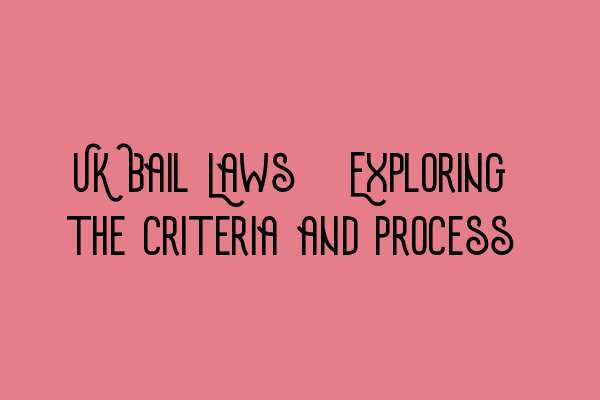UK Bail Laws: Exploring the Criteria and Process
In the criminal justice system of the United Kingdom, bail plays a crucial role in ensuring a fair and efficient legal process. Bail allows individuals accused of a crime to be released from custody while awaiting trial or other legal proceedings. Understanding the criteria and process for granting bail is essential for both defendants and legal practitioners.
The Criteria for Granting Bail
To determine whether an individual should be granted bail, the court considers several factors:
- Flight Risk: The court assesses the likelihood of the defendant fleeing the jurisdiction and considers factors such as ties to the community, previous history of failing to appear in court, and access to financial resources.
- Public Safety: The court evaluates the potential risk the defendant may pose to the public if released, considering factors such as the nature and seriousness of the alleged offense and the defendant’s criminal history.
- Reoffending Risk: The court considers the likelihood of the defendant committing further offenses if released, taking into account prior convictions and any pending criminal charges.
- Witness Intimidation: If there is a concern that the defendant may intimidate witnesses or interfere with the administration of justice, the court may refuse bail.
- Custodial Safety: The court considers the safety and well-being of the defendant while in custody and may grant bail if it concludes that alternative measures, such as electronic monitoring or reporting to a designated location, can adequately address any risks.
It is important to note that each case is unique, and the court’s decision regarding bail is based on an individual assessment of the specific circumstances. Factors such as the strength of the evidence against the defendant, their character, and the potential length of their sentence may also be considered.
The Process for Applying for Bail
In the UK, the process for applying for bail typically involves the following steps:
- Arrest: If a person is arrested, they are taken into custody by the police.
- First Court Appearance: The defendant is brought before a magistrate or judge for their initial court appearance. At this stage, bail is often considered.
- Bail Hearing: If the defendant wishes to apply for bail, a separate bail hearing may be scheduled. During the hearing, the defense can present arguments and evidence in support of bail.
- Court Decision: After considering the factors mentioned earlier, the court will make a decision regarding bail. The court may grant bail with or without conditions, or deny bail and remand the defendant in custody until trial or other legal proceedings.
It is important to seek legal advice and representation when applying for bail, as the process can be complex, and the outcome can have a significant impact on the defense strategy and the overall course of the case.
For more information on criminal law in the UK and related topics, please check out these articles:
- SQE Exam Prep: Essential Study Materials for Aspiring Solicitors
- Demystifying the Solicitors Qualifying Examination Format
- SQE Exam for International Lawyers: Challenges and Success Strategies
- LLC Formation Made Simple: Step-by-Step Guide for UK Entrepreneurs
- LLC Formation: A Step-by-Step Guide for UK Entrepreneurs
At SQE Criminal Law & Practice Law UK, we provide comprehensive legal services in criminal law matters. Our team of experienced solicitors is dedicated to protecting the rights and interests of our clients. If you require legal assistance or have any questions related to bail laws in the UK, please contact us today.
